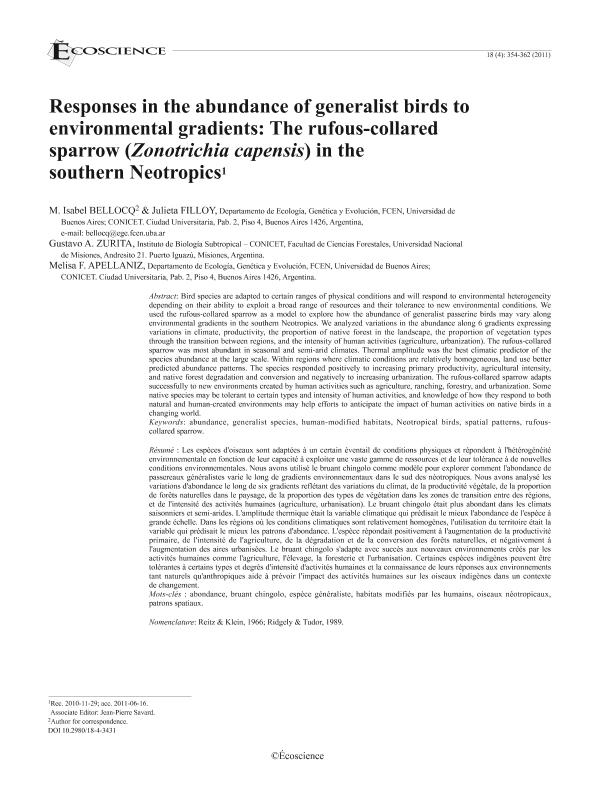Mostrar el registro sencillo del ítem
dc.contributor.author
Bellocq, Maria Isabel

dc.contributor.author
Filloy, Julieta

dc.contributor.author
Zurita, Gustavo Andres

dc.contributor.author
Apellaniz, Melisa Florencia

dc.date.available
2019-01-28T18:11:36Z
dc.date.issued
2011-12
dc.identifier.citation
Bellocq, Maria Isabel; Filloy, Julieta; Zurita, Gustavo Andres; Apellaniz, Melisa Florencia; Responses in the abundance of generalist birds to environmental gradients: The rufous-collared sparrow (Zonotrichia capensis) in the southern Neotropics; Taylor & Francis; Ecoscience (sainte-foy); 18; 4; 12-2011; 354-362
dc.identifier.issn
1195-6860
dc.identifier.uri
http://hdl.handle.net/11336/68762
dc.description.abstract
Bird species are adapted to certain ranges of physical conditions and will respond to environmental heterogeneity depending on their ability to exploit a broad range of resources and their tolerance to new environmental conditions. We used the rufous-collared sparrow as a model to explore how the abundance of generalist passerine birds may vary along environmental gradients in the southern Neotropics. We analyzed variations in the abundance along 6 gradients expressing variations in climate, productivity, the proportion of native forest in the landscape, the proportion of vegetation types through the transition between regions, and the intensity of human activities (agriculture, urbanization). The rufous-collared sparrow was most abundant in seasonal and semi-arid climates. Thermal amplitude was the best climatic predictor of the species abundance at the large scale. Within regions where climatic conditions are relatively homogeneous, land use better predicted abundance patterns. The species responded positively to increasing primary productivity, agricultural intensity, and native forest degradation and conversion and negatively to increasing urbanization. The rufous-collared sparrow adapts successfully to new environments created by human activities such as agriculture, ranching, forestry, and urbanization. Some native species may be tolerant to certain types and intensity of human activities, and knowledge of how they respond to both natural and human-created environments may help efforts to anticipate the impact of human activities on native birds in a changing world.
dc.format
application/pdf
dc.language.iso
eng
dc.publisher
Taylor & Francis

dc.rights
info:eu-repo/semantics/openAccess
dc.rights.uri
https://creativecommons.org/licenses/by-nc-sa/2.5/ar/
dc.subject
Abundance
dc.subject
Generalist Species
dc.subject
Human-Modified Habitats
dc.subject
Neotropical Birds
dc.subject
Rufouscollared Sparrow
dc.subject
Spatial Patterns
dc.subject.classification
Otras Ciencias Biológicas

dc.subject.classification
Ciencias Biológicas

dc.subject.classification
CIENCIAS NATURALES Y EXACTAS

dc.title
Responses in the abundance of generalist birds to environmental gradients: The rufous-collared sparrow (Zonotrichia capensis) in the southern Neotropics
dc.type
info:eu-repo/semantics/article
dc.type
info:ar-repo/semantics/artículo
dc.type
info:eu-repo/semantics/publishedVersion
dc.date.updated
2019-01-25T13:34:54Z
dc.journal.volume
18
dc.journal.number
4
dc.journal.pagination
354-362
dc.journal.pais
Canadá

dc.description.fil
Fil: Bellocq, Maria Isabel. Universidad de Buenos Aires. Facultad de Ciencias Exactas y Naturales. Departamento de Ecología, Genética y Evolución; Argentina. Consejo Nacional de Investigaciones Científicas y Técnicas. Oficina de Coordinación Administrativa Ciudad Universitaria. Instituto de Ecología, Genética y Evolución de Buenos Aires. Universidad de Buenos Aires. Facultad de Ciencias Exactas y Naturales. Instituto de Ecología, Genética y Evolución de Buenos Aires; Argentina
dc.description.fil
Fil: Filloy, Julieta. Consejo Nacional de Investigaciones Científicas y Técnicas. Oficina de Coordinación Administrativa Ciudad Universitaria. Instituto de Ecología, Genética y Evolución de Buenos Aires. Universidad de Buenos Aires. Facultad de Ciencias Exactas y Naturales. Instituto de Ecología, Genética y Evolución de Buenos Aires; Argentina. Universidad de Buenos Aires. Facultad de Ciencias Exactas y Naturales. Departamento de Ecología, Genética y Evolución; Argentina
dc.description.fil
Fil: Zurita, Gustavo Andres. Consejo Nacional de Investigaciones Científicas y Técnicas. Centro Científico Tecnológico Conicet - Nordeste. Instituto de Biología Subtropical. Universidad Nacional de Misiones. Instituto de Biología Subtropical; Argentina
dc.description.fil
Fil: Apellaniz, Melisa Florencia. Universidad de Buenos Aires. Facultad de Ciencias Exactas y Naturales. Departamento de Ecología, Genética y Evolución; Argentina. Consejo Nacional de Investigaciones Científicas y Técnicas; Argentina
dc.journal.title
Ecoscience (sainte-foy)

dc.relation.alternativeid
info:eu-repo/semantics/altIdentifier/url/https://www.tandfonline.com/doi/abs/10.2980/18-4-3431
dc.relation.alternativeid
info:eu-repo/semantics/altIdentifier/doi/https://doi.org/10.2980/18-4-3431
Archivos asociados
